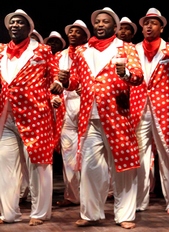SITE GUIDE
SEARCH
REVIEWS
REVIEW ARCHIVES
ADVERTISING AT CURTAINUP
FEATURES
NEWS
Etcetera and
Short Term Listings
LISTINGS
Broadway
Off-Broadway
NYC Restaurants
BOOKS and CDs
OTHER PLACES
Berkshires
London
California
New Jersey
DC
Connecticut
Philadelphia
Elsewhere
QUOTES
TKTS
PLAYWRIGHTS' ALBUMS
LETTERS TO EDITOR
FILM
LINKS
MISCELLANEOUS
Free Updates
Masthead
Writing for Us
A CurtainUp  London Review
London Review
 London Review
London ReviewIsango Ensemble: Aesop’s Fables/The Ragged Trousered Philanthropists/La Bohème
by Sebastian King
|
What looks like a man, walks like a man, talks like a man, but wears chains like a dog? — Hermes, Aesop’s Fables
|

Isango Male Ensemble Membersin The Ragged Trousered Philanthropists (Photo: Afridiziak) |
The first of these shows is Aesop’s Fables, a family-friendly commentary on slavery and freedom which follows Aesop (Luvo Rasemeni) on a quest for freedom from his tyrannical buffoon of a master Escallywags (Simphiwe Mayeki). Instructed by Hermes (Busisiwe Ngejane) — a diva in gold with sassy attitude and riffs to match — to learn from the animals, he travels towards Mount Olympus, picking up important advice such as ‘where there’s a will, there’s a way,’ and ‘look before you leap’ from the various creatures he meets along the way, including a troupe of busy ants, a big-but-not-so-bad wolf, a Rastafarian goat and of course the Hare and the Tortoise, whose famous race runs in parallel to Aesop’s journey. With frequent outbursts of upbeat song and plenty of comic moments, the joyous energy of the performers is contagious, and it is impossible not to leave the auditorium smiling.
Next up is The Ragged Trousered Philanthropists which relocates Robert Tressell’s socialist novel from Edwardian England to 1950s Cape Town. Solomon (Mhlekazi ‘Whawha’ Mosiea) is a painter struggling to persuade his co-workers that they can change their situation, and shouldn’t resign themselves to a life in poverty in the face of Apartheid. Despite moments of humour, the tone is much darker, and the production is stripped right back. Although there is music throughout, it is performed a capella: a female ensemble in whiteface makeup performs a recurring version of ‘We’re In The Money’ while the workers sing songs of the struggle, and at one point a rousing rendition of the protest song ‘Red Flag’.
The final production is La Bohème, with its community of artists living in the Khaleyitsha township of modern-day Cape Town, a place where the effects of poverty and the threat of TB are all too real. Conducted by Mandisi Dyantyis, the orchestra of marimbas and steel pans completely transform Puccini’s score, and the ensemble are in fine operatic voice. Partnered with Mosiea’s tender Lungelo/Rudolpho, Pauline Malefane as Mimi is full of warmth and vulnerability and her crisp soprano made me feel like I was hearing the music for the first time. A special mention must also go to Nobulumko Mngxekeza who almost threatens to steal the show as the seductive Musetta.
Never has the word ‘ensemble’ seemed so apt. The whole company rarely leave the stage throughout the three performances. It speaks volumes that despite playing the lead in La Bohème, Malefane is just at home playing the marimba at the back of the stage – and even taking on the humbling cameo role of Ass – in Aesop’s Fables. A strong sense of community flows through these three plays, not just thematically, but in the connections these performers have with their material, with each other, and with their audience. A film of La Bohème produced by Stephen Daldry will be going into production shortly, but don’t miss this opportunity to catch this very special company live.
|
Subscribe to our FREE email updates with a note from editor Elyse Sommer about additions to the website -- with main page hot links to the latest features posted at our numerous locations. To subscribe,
E-mail: esommer@curtainup.comesommer@curtainup.com
put SUBSCRIBE CURTAINUP EMAIL UPDATE in the subject line and your full name and email address in the body of the message -- if you can spare a minute, tell us how you came to CurtainUp and from what part of the country. |
| Isango Ensemble: Aesop’s Fables/The Ragged Trousered Philanthropists/La Bohème
|
|
REVIEW FEEDBACK Highlight one of the responses below and click "copy" or"CTRL+C"
Paste the highlighted text into the subject line (CTRL+ V): Feel free to add detailed comments in the body of the email . . . also the names and emails of any friends to whom you'd like us to forward a copy of this review. |




